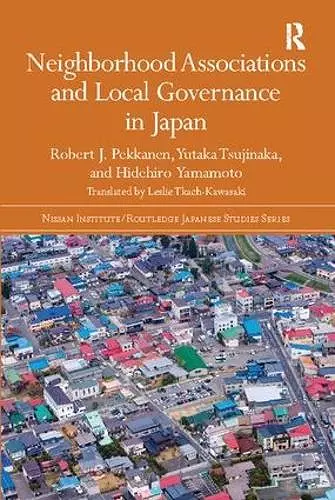Neighborhood Associations and Local Governance in Japan
Robert J Pekkanen author Yutaka Tsujinaka author Hidehiro Yamamoto author Leslie Tkach-Kawasaki translator
Format:Paperback
Publisher:Taylor & Francis Ltd
Published:25th May '17
Currently unavailable, and unfortunately no date known when it will be back
This paperback is available in another edition too:
- Hardback£150.00(9780415745734)

Although local neighborhood associations are found in many countries, Japan’s are distinguished by their ubiquity, scope of activities, and very high participation rates, making them important for the study of society and politics. Most Japanese belong to one local neighborhood association or another, making them Japan’s most numerous civil society organization, and one that powerfully shapes governance outcomes in the country. And, they also often blur the state-society boundary, making them theoretically intriguing.
Neighborhood Associations and Local Governance in Japan draws on a unique and novel body of empirical data derived from the first national survey of neighborhood associations carried out in 2007 and provides a multifaceted empirical portrait of Japan’s neighborhood associations. It examines how local associational structures affect the quality of local governance, and thus the quality of life for Japan’s citizens and residents, and illuminates the way in which these ambiguous associations can help us refine civil society theory and show how they contribute to governance. As well as outlining the key features of neighbourhood associations, the book goes on to examine in detail the way in which neighbourhood associations contribute to governance, in terms of social capital, networks with other community organizations, social service provision, cooperation with local governments and political participation.
This book will be welcomed by students and scholars of Japanese politics, Japanese society, anthropology, urban studies as well as those interested in social capital and civil society.
"This book will help shift the focus of future research on neighborhood associations to also address urban realities. Why are successfully organized associations emerging in urban areas, and how should we assess the advantages and disadvantages of these associations? Japan is a country where 80% of the population now lives in urban areas. This book reveals the diverse nature of associations providing social services in urban areas, and we can only hope that future research will incorporate more recently prevalent housing arrangements, such as condominiums and rented homes, which were not covered by the study on which this book is based."
Yosuke Sunahara Osaka University
Social Science Japan Journal, vol 19, no 1, January 2016 115
ISBN: 9781138089488
Dimensions: unknown
Weight: 249g
258 pages